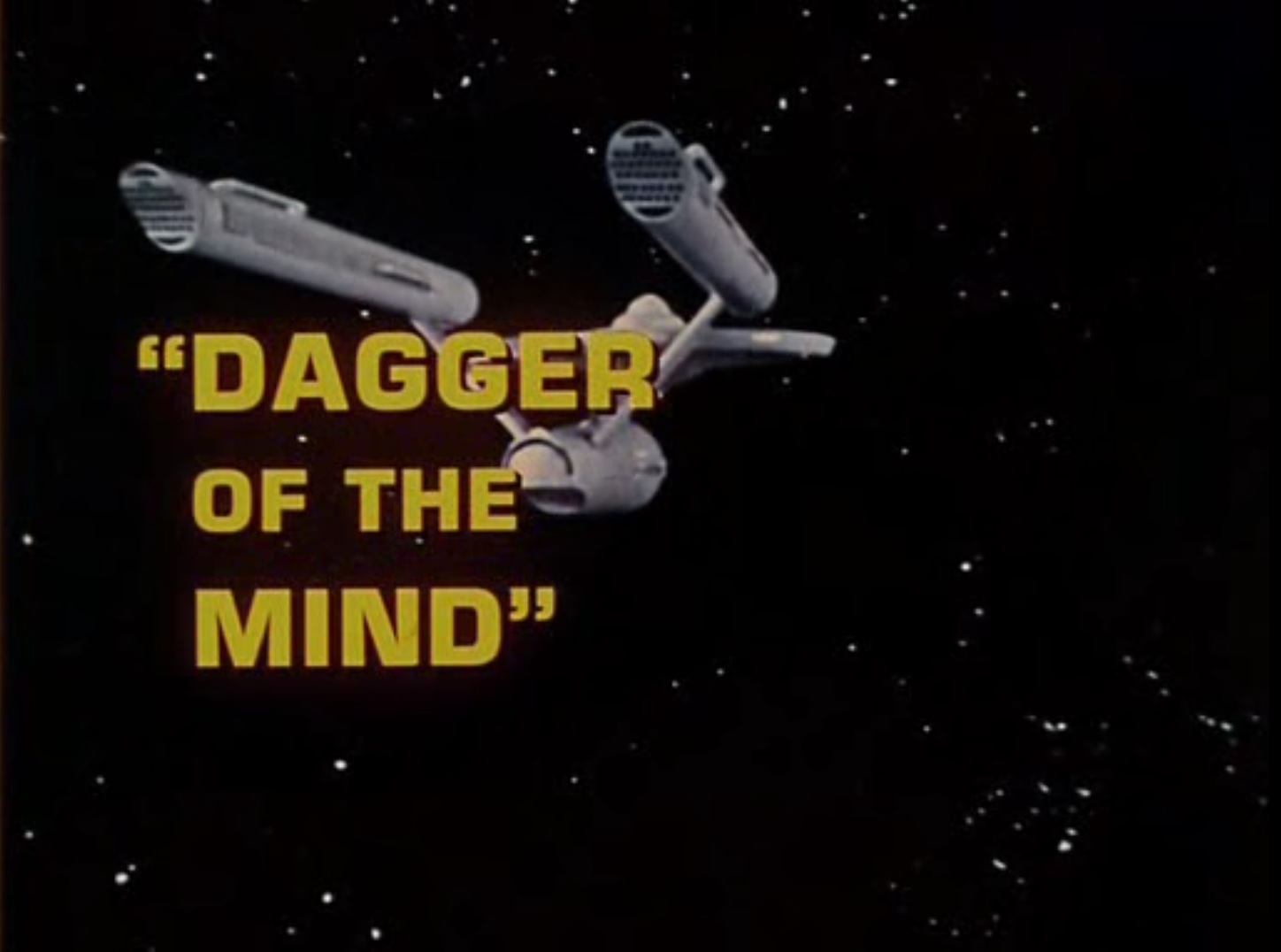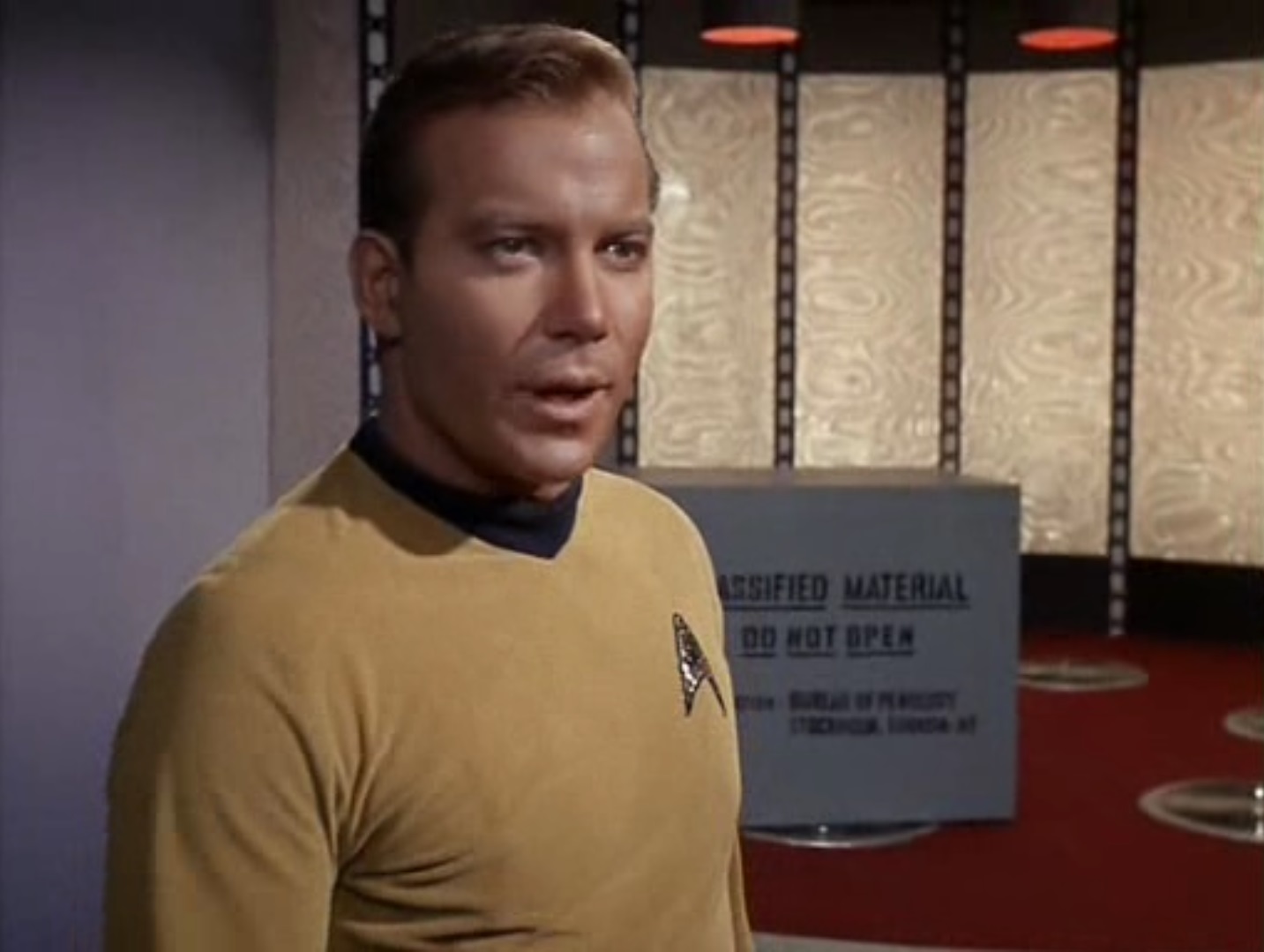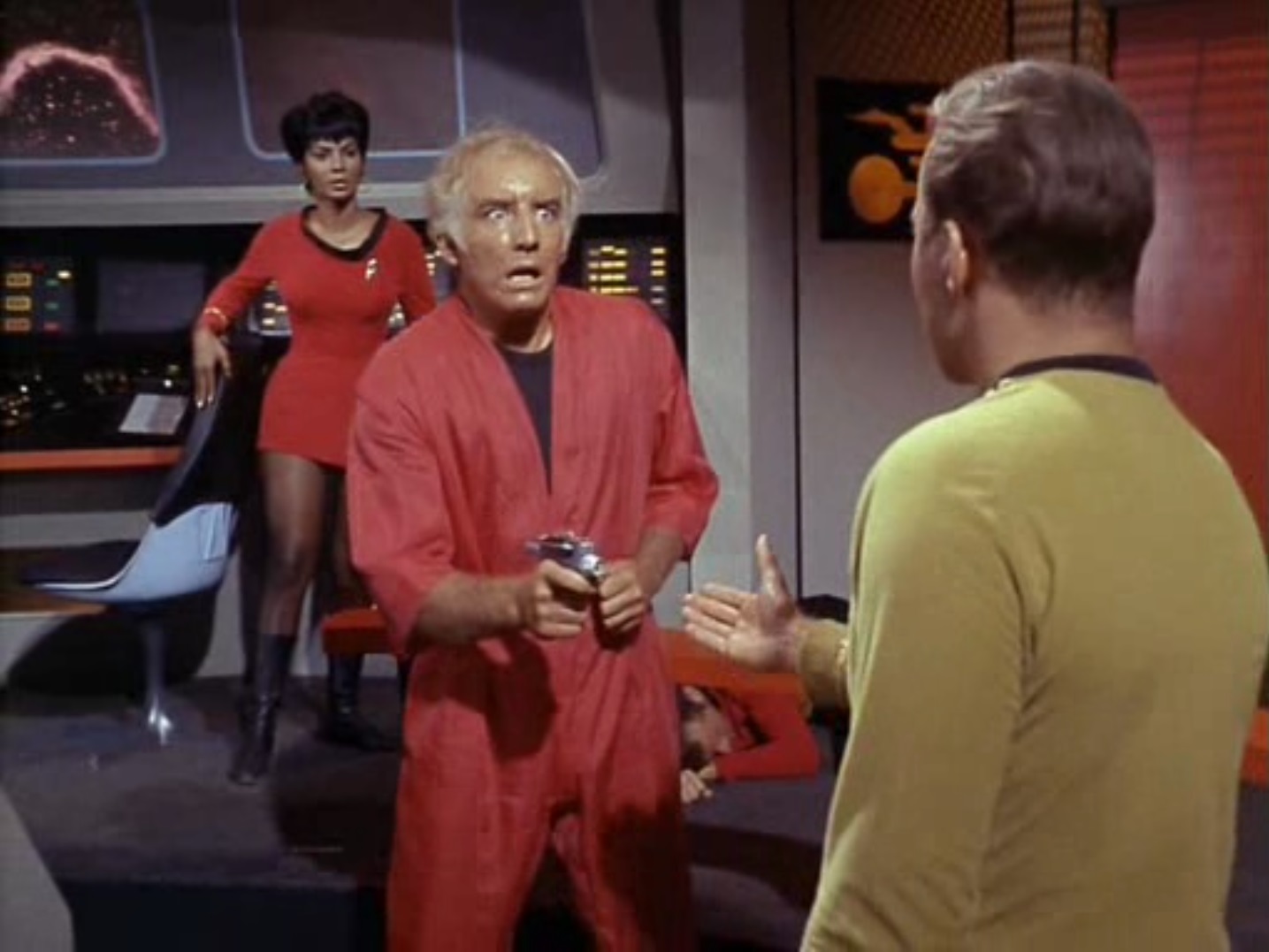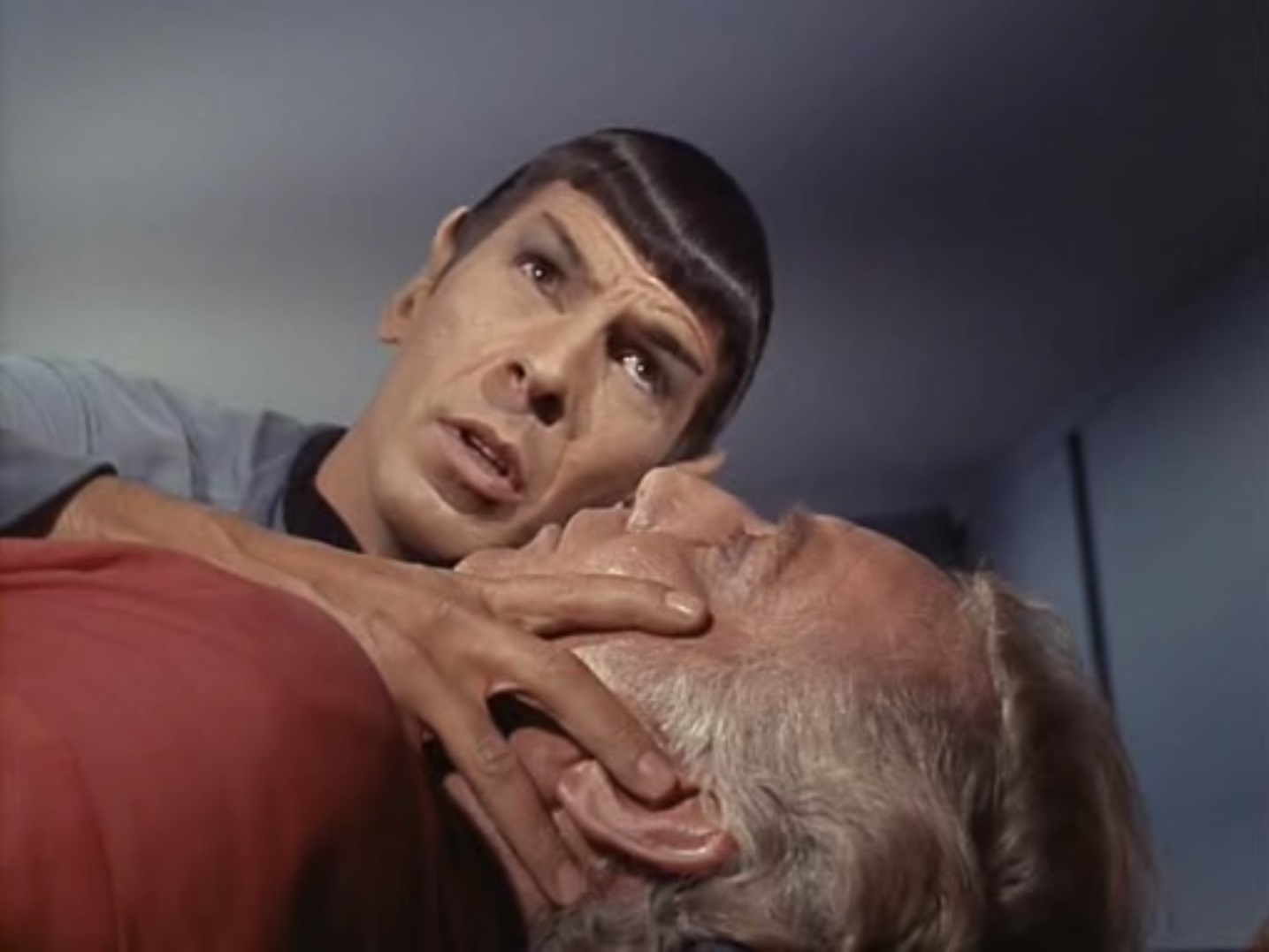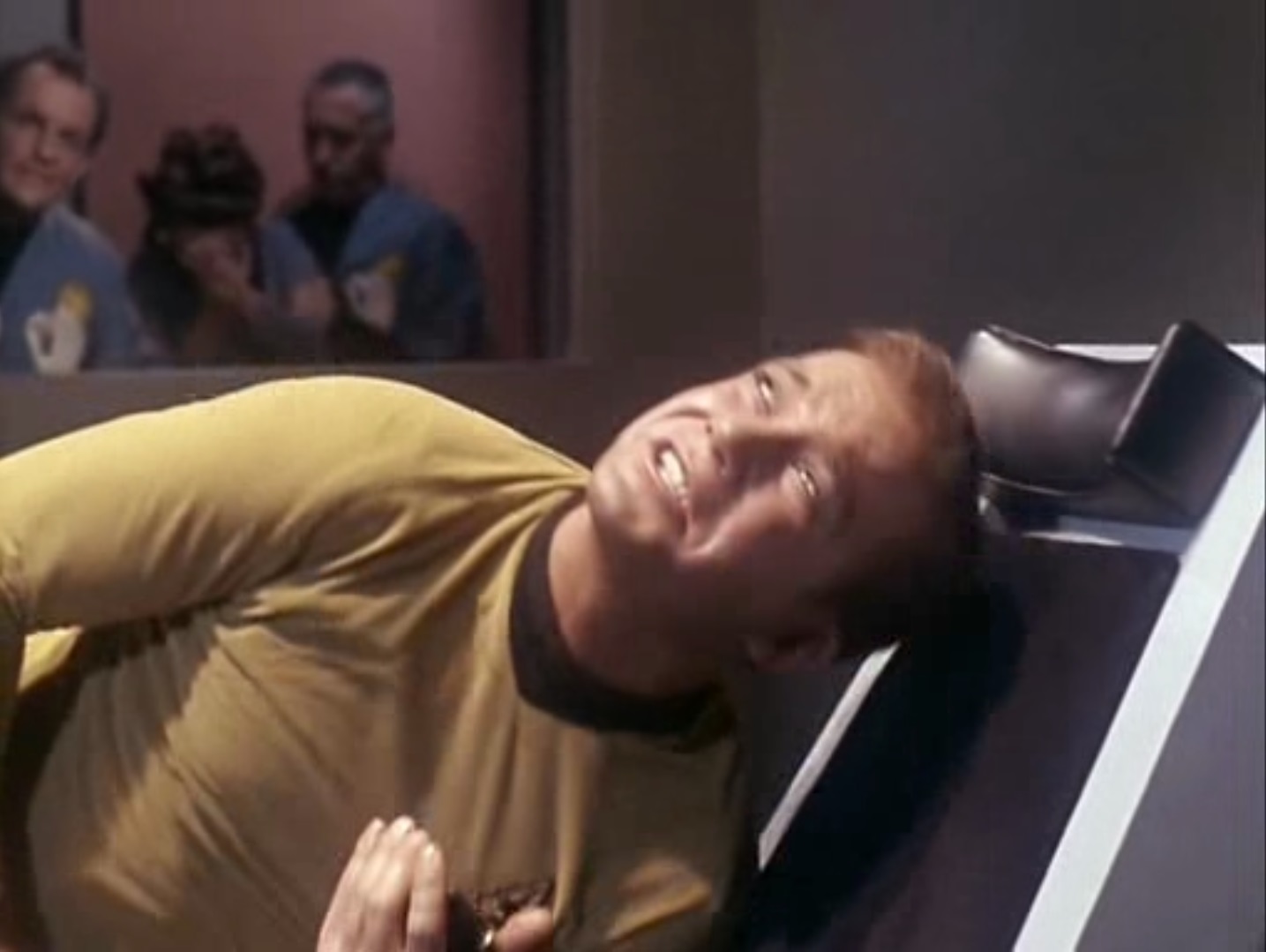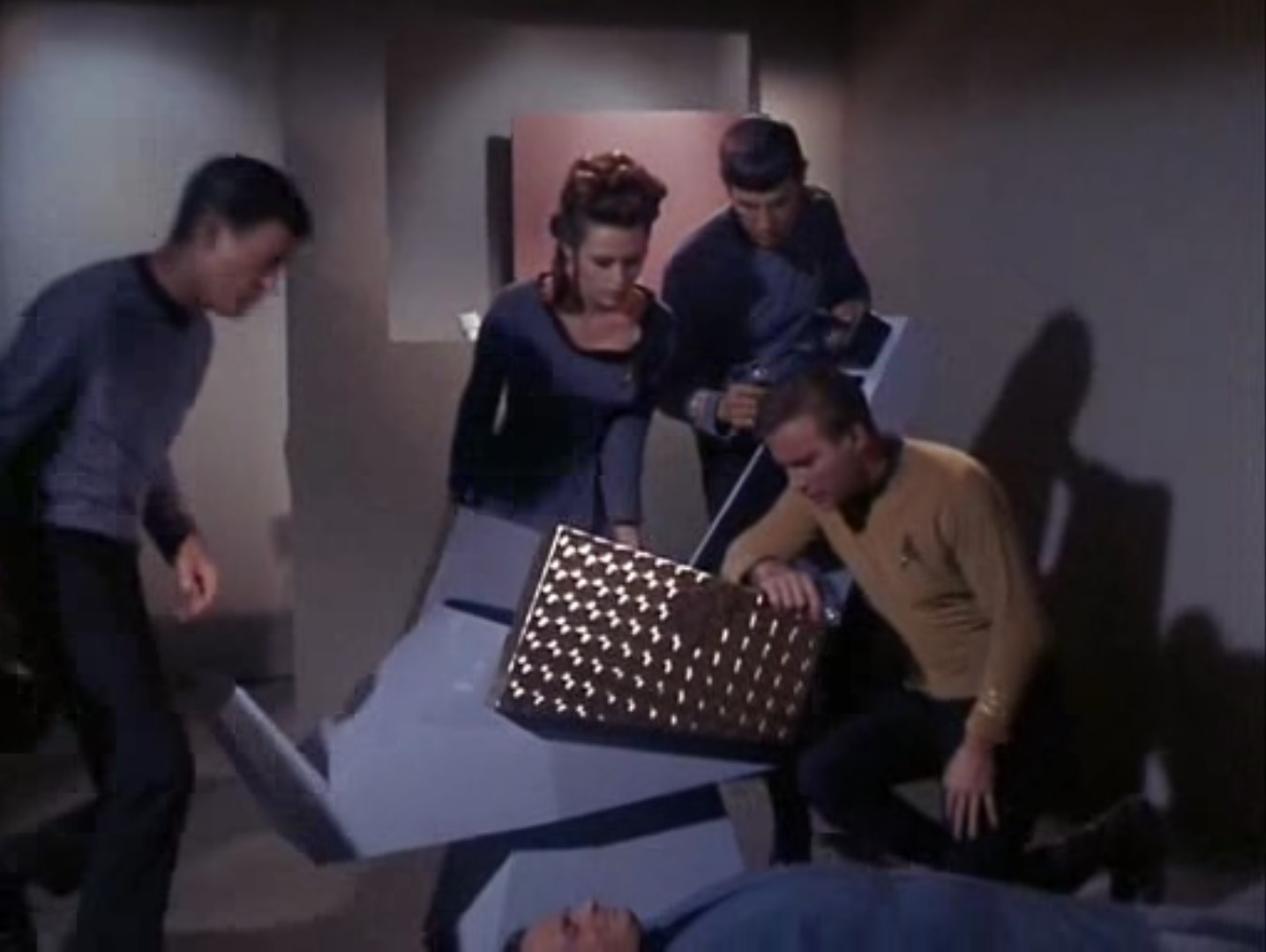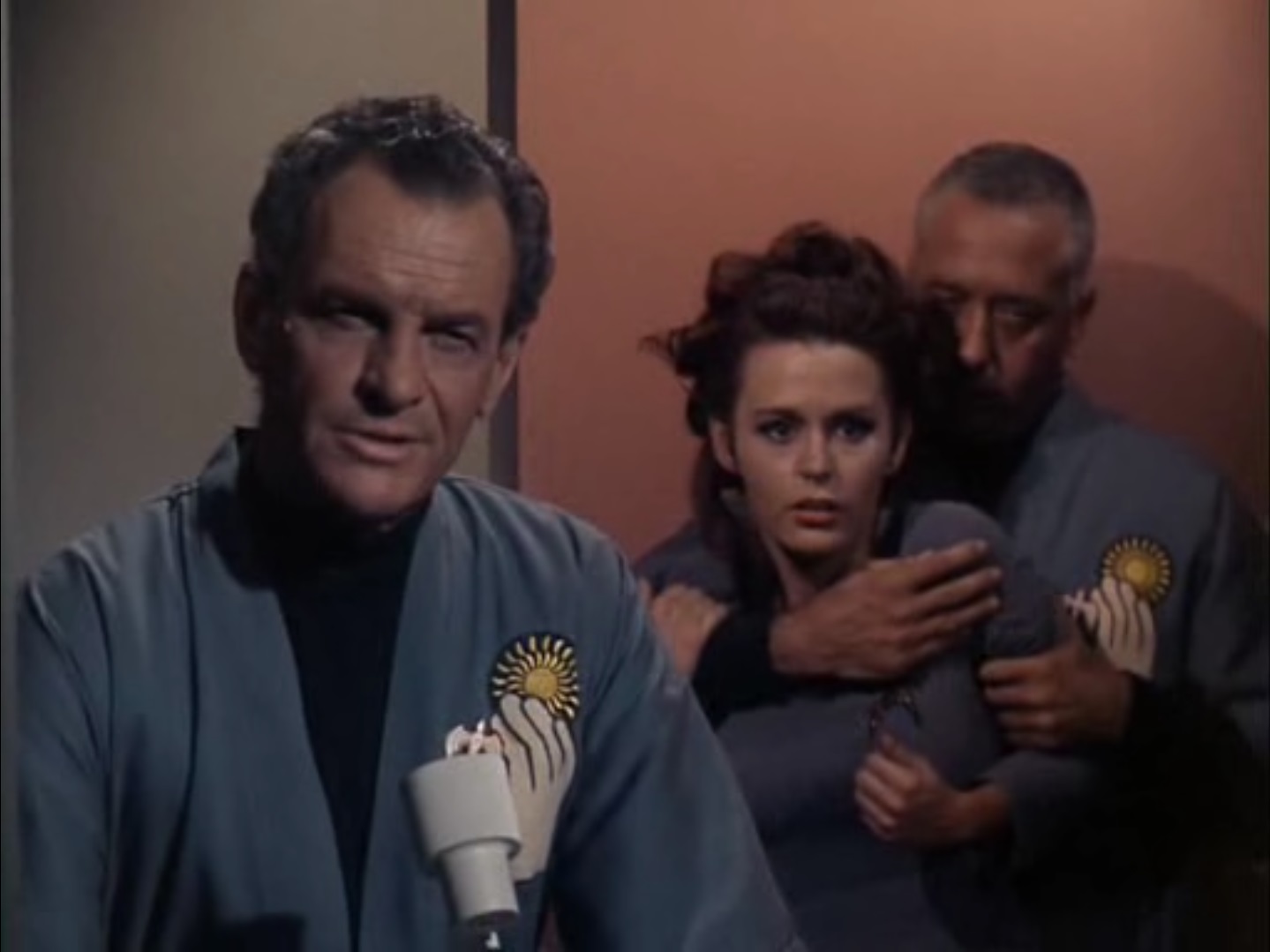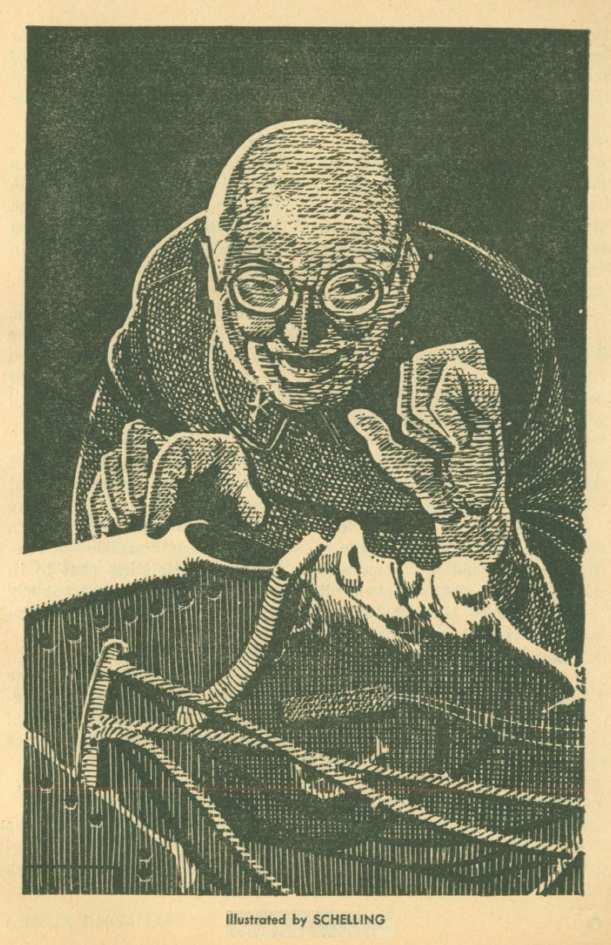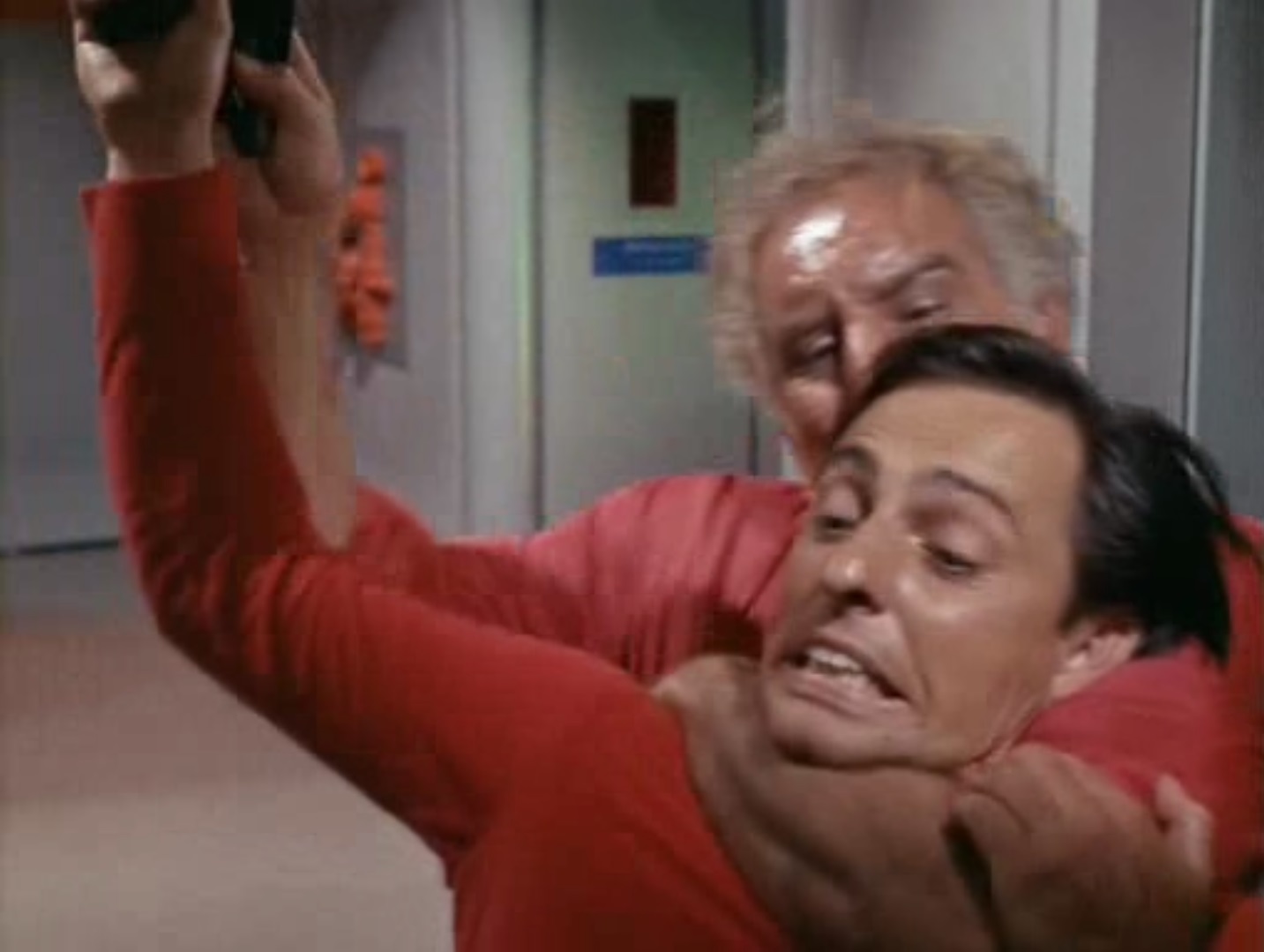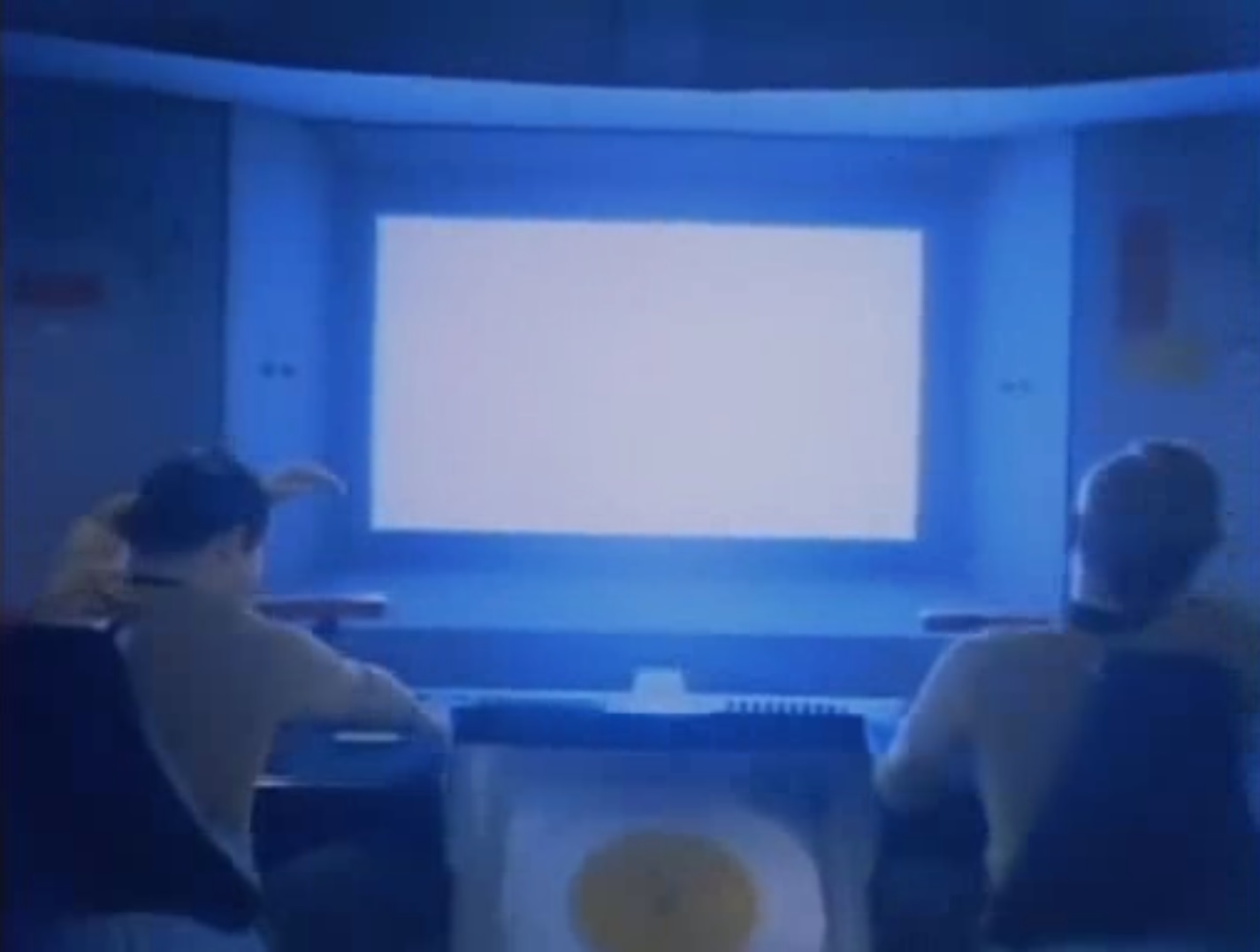
by Gideon Marcus
Last year, Star Trek creator Gene Roddenberry won science fiction's highest award, the Hugo, for writing the two-part episode "The Menagerie". It was a deserved laurel. After all, he not only had written the excellent pilot that formed the germ of the double-show, but also made a reasonably interesting extension to fit the new format.
Unfortunately, Roddenberry has yet to reach that high water mark again. Despite having plenty of screenwriting experience, he seems to only have had that one good story in him. First, there was his disappointing adaptation of "A Private Little War", originally by Jud Crucis (that's got to be a kind of Cordwainer Bird). And now, we have his worst outing yet–"The Omega Glory":

The setup should be interesting. Kirk, Spock, McCoy, and the red-shirted Lieutenant GAWLway beam aboard the abandoned but undamaged starship Exeter in orbit around an uncharted planet. Everyone onboard has been reduced to crystals–sort of a reverse "Man Trap" phenomenon. This seems shocking to Kirk and co. despite having seen a very similar phenomenon just last episode. Obeying the exhortations of a tape by the mortally ill Exec of the Exteter (who, like Spock, is apparently a double-duty officer), they beam down to the planet.

"Save yourselves! Go down to the planet! I dunno why we don't, but you go ahead!"
There, they meet Captain Ron Tracey, the second active-duty Starfleet captain we've seen other than Kirk (we met four others in "Court Martial", at least one of whom had graduated to Starbase running). According to Tracey, the planet confers immunity to the disease that killed his entire crew when the rest of the landing party beamed back aboard. Also, the planet somehow makes all the inhabitants live life spans measured in millennia.
In the six months since Tracey beamed down, he teamed up with the 'Coms', "yellow" city-dwellers under siege by the savage "white" people. Flagrantly violating the Prime Directive, more explicitly spelled out here than in any episode prior, he exhausted his hand phaser defending the village.

"We drained four of our phasers, and they still came. We killed thousands and they still came."
Now that Kirk is here, Tracey wants to go into the immortality bottling business, distilling the essence of the anti-disease and anti-aging qualities of the planet.
Except, as Bones soon figures out, there is no such thing. The immunity is a natural (and permanent) phenomenon, and the natives live a long time because of freak genetics resulting from the near-total bacteriological catastrophe that wiped out civilization centuries before.
That's one thread of the episode. The other involves finding out that this is a parallel Earth, like "Miri", and the 'Yangs' are the descendants of Americans (white ones, of course), adopting the ways of the Indians in order to survive, but carrying a corrupted tradition of Founding Father document worship. Thus, they mangle the Pledge of Allegiance and the Constitution's preamble without understanding. Luckily, Kirk is an avid historian, and he explains what these holy words really mean. He also insists that the Coms (what's left of them–it appears the Yangs have killed nearly all of them by the end) are people too, and they need to be treated with the dignity and equality prescribed by our nation's most central document.

"This document is absolutely perfect as is. It's a good thing you never made any changes to it."
And then they beam back to the Enterprise. Happy endings for everyone.
Except the audience, of course.
So much about this show doesn't make sense, from the lack of children, to the paucity of population centers, to the way genetics and natural immunity works on the planet. I won't even touch the racial aspects of the episode, which my colleagues are champing at the bit to address.
I will say that I am utterly confused by Captain Tracey's actions. We've been led to believe that Starship captains are a breed apart. Sure, Commodore Decker had his issues, but they were understandable given his situation. But Tracey? As soon as his crew fell ill and he didn't, you'd think he'd have beamed at least some of his people down. And certainly he'd hold sacred the highest of orders (though not the one that violation incurs the death penalty. That's number four.) Instead, he lets his crew die, doesn't warn Star Fleet of his situation, and becomes a little dictator.

"Crew? What crew?"
The only thing that could possibly explain the situation is that "Ron Tracey" is actually Dr. Simon van Gelder, escaped from Tantalus without being cured, somehow assuming Captain Tracey's guise and stealing the "Exeter". Outlandish? Sure, but no more than this episode.

"I'm the real Captain Tracey!"
Two stars. Why two? Because I actually kind of dug how the show went back to the parallel Earth thing and didn't just abandon it for one episode. Of course, they didn't do very much good with it…
When Worse Comes to Worst

by Janice L. Newman
We’ve had the best of episodes, we’ve had the worst of episodes. But never have I watched an episode so infuriating as “The Omega Glory”.
Like last week’s By Any Other Name, the story starts out promising. We’re swept up in the mystery and the danger to the senior officers we’ve come to know and love. And like “By Any Other Name”, it seems that “The Omega Glory” is prepared to play against expectations. On the planet Omega, the white people are violent and savage, while the non-white people (in this case apparently of Asian extraction) are peaceful and good. What a switch!
Just kidding! It turns out that the white people are the good guys after all. They’ll be setting up a democratic government any day now, and they’ll even let those no-good commies in…as long as the commies are okay with living under their system.

"I am Cloud McCarthy, and this is Wise Dicknixon. We promise equality and fairness for the Coms."
I described Patterns of Force as “subtle as a brick”, but this episode went beyond that. The pro-democracy message was as direct and painful as a bludgeon to the face. It was all the more insulting in the way the white “yangs” (“Yankees”, GET IT?) started out as savage, violent, unwilling to parley or compromise, yet were still painted as the triumphant good guys in the end, for no other reason than that they were descendents of a Christian nation with an American democratic system (despite literally having no understanding of the very documents and principles they revered).
One grudging star, only because I can’t give it zero.
Losers Keepers

by Joe Reid
I recently saw a preview at the theater for the upcoming Planet of the Apes movie (based on the book) starring Charlton Heston. It's a flick about a world where cavemen-like humans in rags are dumb beasts and mistreated by the intelligent thinking and talking apes.
Much like this week's episode, which featured wild men dressed in rags that appeared to be unable to speak and behaved like beasts. A couple of months back we had the “Gamesters of Triskelion", which featured a Master Thrall Galt who shared the look of Ming the Merciless from “Flash Gordon”. In fact it was that same episode that had me complaining about the amount of borrowing or sometimes outright theft that Star Trek employs in its stories.
If imitation is the best form of flattery, Star Trek is the Casanova of Burbank, California! The number of its paramours have surely become legion. Much like the erstwhile lover of legend, Star Trek is never able to focus on attaching to one thing at a time. Episodes must borrow from multiple sources. Even from other episodes of Star Trek. For example, just last week we saw an episode where the powerful Kelvans turned members of the crew into white minerals. This week a disease did it. Two weeks ago the Nazis from Earth history showed up on another planet. This week the US flag and constitution showed up, for no reason other than to attempt to throw a twist at the audience. Both of these last two examples make me feel as if I am watching an episode of the Twilight Zone instead of Star Trek. So many episodes of that show introduce elements into settings where they should not exist. When it happened in the Twilight Zone it was thought provoking. When it keeps happening in Star Trek, it lacks the same effect and is starting to leave me pining for repeats of the episodes that have more original stories.

"A man…can't just…turntosalt!" "Captain, need I remind you what happened just last episode?"
I’d love for new episodes to stop with the borrowed elements and stick to bold new content, not plucked from the theaters, or the current newspaper headlines, or popular Earth characters like Jack the Ripper.
Although the recent “Patterns of Force” was not an episode that I loved, I do love the fact that it was original and not an obvious rip-off from something else. “The Omega Glory” could have been more glorious had its elements not been entirely borrowed. That's only one of its sins, of course, but it'd be a start.
1 star
Beyond the Pale

by Amber Dubin
I want to preface myself by saying I am whole-heartedly enraptured with Star Trek. It is my first and only love, the only fictional universe I'd gladly abandon my own life to walk one day in its storyline, and I'd defend the continuation of this show to the death and beyond. I feel the need to profess my undying loyalty as a fan of this series, because I am about to unleash a diatribe that could only be wrought by the betrayal of an immeasurable love. This episode made me apoplectic. I've had my hackles raised from some insulting implications about the nature of women or certain races, but so far most of my reactions have been to subtleties. Subtle this episode was not.
The least subtle attack on my sensibilities was the racism. The Yangs are introduced as inhuman savages that cannot be reasoned with when they are first encountered. However, it turns out that they are not feral, merely driven wild by religious fervor. The supertext is that the Yangs' nature is that of Native Americans (what we have ignorantly called, for centuries, 'Indians'). I cannot begin to describe how offensive this concept is. Gene Roddenberry is saying here that Native Americans as a race are naturally a savage subspecies of whites, but they, like the fictional Vulcans, have trained to control their natures through a spirituality reverential governmental system. The fundamental insult lies in the implication that the government of whites partially tamed their savage nature (only partially, because the whole time sacred ceremonies take place, the majority of the tribe is outside yipping and howling at the moon). I hate that I have to explain this, but in reality, Native Americans have had democratic systems in place before most white societies that the white founding fathers actually drew from when they were drafting their governmental systems. In addition, the role of spirituality in most ancient Native American tribes was not a controlling cult-like obsession as could be argued is displayed by many modern organized religions, and was instead a much subtler, reverential guiding force that soothed the more offensive natural human instincts like a balm rather than a set of shackles.

"What do you mean 'they're too white?' What do you think this is? High Chapparal?"
Unfortunately the racial attacks in this episode are not only leveled at the Native American peoples. When it comes to the Comms, although it is implied that their genetics/immunological resistance is superior to humans, they are also implied to be inferior to the white race. This is apparent in the way that they immediately recognize Ron Tracey as their leader, after "getting over the shock of [his] white skin." This is offensive not only in the way it implies innate white supremacy, but also in the way they imply that it is natural for "asiatic races" to choose innately flawed governmental systems (godless totalitarianism and communism – for shame!) over the morally upright white, democratic Republicans. They even managed to throw in fetishization of female Asians just because this steaming pile of an episode needed a little sexism for spice.
And the science! My God, the poor, poor science! I'm too angry to even go into how terribly this episode mangled the concepts of genetic and cultural evolution. It didn't even have the most basic understanding of immunology and epidemiology! The fact that any of the plot of this episode made it off the cutting room floor goes beyond the pale of my tolerance and understanding. To say I am deeply disappointed in Gene Roddenberry is an understatement of the highest degree.
I wish I could give it less than one star, but I, like the actors in these scenes, am contractually bound by the system in which I work.
One star
Speaking of Star Trek, it's on tomorrow! And it seems to presage a civil war…
Here's the invitation! Come join us.

![[March 8, 1968] Inglorious (<i>Star Trek</i>: "The Omega Glory")](https://galacticjourney.org/wp-content/uploads/2023/03/680308title-672x372.jpg)


![[November 10, 1966] <i>Star Trek</i>: "Dagger of the Mind"](https://galacticjourney.org/wp-content/uploads/2021/11/661110title-672x372.jpg)

